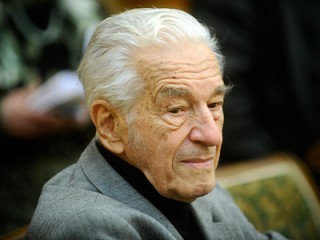
Sergiu Nicolaescu biography
Date of birth : 1930-04-13
Date of death : 2012-01-03
Birthplace : Targu-Jiu, Romania
Nationality : Romanian
Category : Arts and Entertainment
Last modified : 2013-01-03
Credited as : Actor, film director, Dacii, Supravietuitorul
0 votes so far
Sergiu Nicolaescu was born in Targu-Jiu, but he grew up in Timişoara, where his family moved when he was 5 years old. He graduated from the Polytechnic University of Bucharest as a mechanical engineer. After graduation he started to work as a camera operator.
Nicolaescu's debut as a director was in 1962 with the short film "Scoicile nu au vorbit niciodată (Shells Have Never Spoken)". His first feature film was the 1966 French-Romanian co-production "Dacii (Les Guerriers)". Nicolaescu continued his film-making career by directing a large number of movies and also starring in many of his own movies.
Most of Nicolaescu's movies are centered on figures and events in Romanian history. The scripts are conceived to promote the figure or the event, and usually convey nationalist messages. During the Communist period, some of his movies were seen as ground-breaking through their way of publicly presenting Romanian history, while other have been considered as simple nationalist propaganda. For instance, the movie "Războiul independenţei" was the first Communist-era Romanian file to present a Romanian king (namely Carol I) in a positive fashion. On the other hand, Mircea (1989, also known as Proud Heritage) is often considered as a pure propaganda movie, including elements of personality cult and a legendary, standardised version of reality. Nevertheless, Mircea was officially blocked from distribution, until the Romanian Revolution of 1989 (All I've done was to present a differet state leader than Ceauşescu. He understood and stopped the movie ). After the latter, Nicolaescu expanded on nationalist themes, directing films that shed a positive light on Ion Antonescu, Romania's Axis-aligned dictator in the World War II period (his Începutul adevărului, also known as Oglinda), or glorified the World War I heroine Ecaterina Teodoroiu (Triunghiul morţii, "Triangle of Death"); in both cases, part of the script was contributed by Corneliu Vadim Tudor, leader of the nationalist Greater Romania Party.
An accomplished director of battle scenes, Nicolaescu allegedly produces 70-80 meters of useful shots in the time that the average other director would take to produce 12-15 meters.
Although his recent films have not been as popular as his earlier productions, he continues to direct new films, such as Orient Express (2004) or Cincisprezece (2005), a love story set against the background of the 1989 Revolution.
Nicolaescu began a career as a politician after the Romanian Revolution and was elected to the Romanian Senate in 1992 as a member of the Romanian Social Democratic Party.
Filmography:
Dacii - 1967
Lupta pentru Roma - 1968
Ciorap de piele (co-director Pierre Gaspar) - 1968
Ultimul mohican - 1968
Lacul din Ontario - 1968
Preeria - 1968
Mihai Viteazul - 1971
Atunci i-am condamnat pe toti la moarte - 1972
Cu mainile curate - 1972
Lupul marilor (co-director W. Standte) - 1972
Razbunarea - 1972
Ultimul cartus - 1973
Un comisar acuza - 1974
Nemuritorii - 1974
Insula comorilor - 1975
Piratii - 1975
Zile fierbinti - 1975
Osanda - 1976
Accident - 1977
Razboiul independentei (Pentru patrie) - 1977
Revansa - 1978
Nea Marin miliardar - 1978
Mihail, caine de circ - 1978
Ultima noapte - 1979
Capcana mercenarilor - 1980
Duelul - 1981
Intalnirea - 1982
Viraj periculos - 1982
Ringul - 1983
Ci£utatorii de aur - 1985
Ciuleandra - 1985
Ziua Z - 1985
Noi, cei din linia intai - 1986
Frani§ois Villon - 1987
Mircea - 1989
Coroana de foc - 1990
Cucerirea Angliei - 1990
Inceputul adevarului (Oglinda) - 1993
Punctul zero - 1996
Triunghiul mortii - 1999
Orient Express - 2004
Cincisprezece - 2005




















